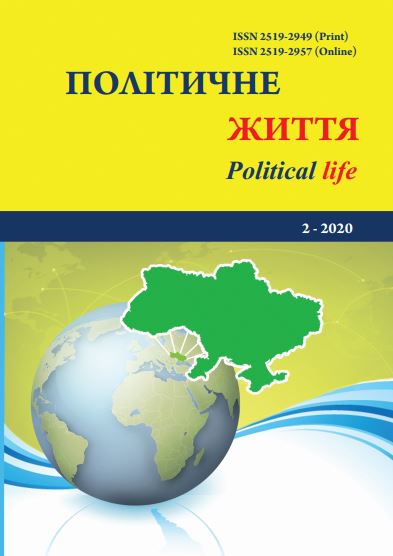COVID-19 and Ukrainian digital political discourse transformation in 2020.
DOI:
https://doi.org/10.31558/2519-2949.2020.2.14Keywords:
digital political discourse, Ukraine, COVID-19, political text, «Ukrayins’ka pravda»Abstract
A political discourse digitalization potentially may lead to decreasing a disproportion in official andnon-official actors representation in a crisis times, which was observed in mass-media period of the discourse development. To check this hypothesis, the Ukrainian digital political discourse transformation was observed between January-Mau 2020. These data was compared with 2019 data. A corpus of texts was formed form a prominent Ukrainian social and political site «Ukrayins’ka pravda» (more than 10 thousand items). The texts were processed with the help of Python programs. Four indicators were measured: diversification, uniqueness, balance and domestic focus.
The diversification indicator decreased in comparison with 2019 (1,2). In March-April 2020 the indicator had the lowest rate (0,5-0,6). And vice versa, the uniqueness indicator increased and was stable in 2020 – 25-27%. In the quarantine period this characteristic coincided with the Ukrainian digital political discourse characteristics during so called «dead season» (holidays, vacations) in 2019. This shows a lower intensity of political life. Additionally, in March-May lower heterogeneity in a list of the most popular political actors is observed (officials mainly). However, there is a smaller gap between the first (Zelensky) and the second position (Klychko) in the list. And the greatest attention towards internal affairs is considered (domestic focus is higher, than 2019 average).
As a result, it may be claimed, that the Ukrainian digital political discourse has been transforming, due to COVID-19 pandemic. The interrelations between the political actors was minimized, which may testify low engagement of non-official actors or their invisibility in the discourse.
References
Бодрийяр, Ж. Прозрачность зла. Москва: Добросвет, 2020.
Голуб, О. COVID-19 відходить на другий план. Звіт з моніторингу онлайн-медіа. ІМІ. URL: https://imi.org.ua/monitorings/covid-19-vidhodyt-na-drugyj-plan-zvit-z-monitoryngu-onlajn-media-i33275 (дата звернення: 1.06.2020).
ІМІ. 39% спікерів у новинах про коронавірус – регіональні посадовці та політики: дослідження ІМІ. URL: https://imi.org.ua/monitorings/39-spikeriv-v-novynah-pro-koronavirus-regionalni-chynovnyky-ta-polityky-doslidzhennya-imi-i32888 (дата звернення: 1.06.2020).
Лалл, Д. Мас-медіа, комунікація, культура: глобальний підхід. Київ: К. І. С., 2002.
Bailey, O., Cammaerts, B., & Carpentier , N. Understanding Alternative Media. New York: Open University Press, 2008.
Bolder, P. (2020). COVID-19 and World Peace: An Overture to a New Era or Business as Usual? Hague Centre for Strategic Studies. URL: https://hcss.nl/report/covid-19-and-world-peace-overture-new-era-or-business-usual (дата звернення: 1.06.2020). DOI:10.2307/resrep24189
Calabrese, A., Burke, B. American Identities: Nationalism, the Media, and the Public Sphere. Journal of Communication Inquiry. 1992. № 16(2). P. 52–73. DOI:10.1177/019685999201600205
Coombs, T. Parameters for crisis communication. In T. Coombs, & S. Holladay, Handbook of Crisis Communication. Oxford: Blackwell Publishing, 2010. P. 17–53.
Freedom House. Democracy during Pandemic. URL: https://freedomhouse.org/issues/democracy-during-pandemic (дата звернення: 1.06.2020).
Gans, H. Democracy and the News. New York: Oxford University Press, 2004.
Gerken, F., van der Meer, T. Crisis Frame Dynamics: Frame Diversity in News Media and the Role of Governmental Actors. Political Science. 2019. № 2(2). P. 149–180. DOI:10.30658/jicrcr.2.2.
Iggers, J. Good News, Bad News. Journalism. Ethics and the Public Interest. Boulder, Colo.: Westview Press, 1999.
Ilyas, A. Covid-19 Pandemic: Emergence of a New Geopolitical Perspective. Sustainable Development Policy Institute. URL: https://www.jstor.org%2Fkbart%2Fcollections%2Fsustainability-backfile-collection%3FcontentType%3Dresearch_reports&usg=AOvVaw3k7HWb8YWz2d-xB3pWMKFb
(дата звернення: 1.06.2020). DOI:10.2307/resrep24375
Johnson, J., Kaye, B. Wag the Blog: How Reliance on Traditional Media and the Internet Influence Credibility Perceptions of Weblogs Among Blog Users. Journalism & Mass Communication Quarterly. 2004. № 81(3). P. 622–642. DOI:10.1177/107769900408100310
Katz, E., Liebes, T. “No More Peace!”: How Disaster, Terror and War Have Upstaged Media Events. International Journal of Communication. 2007. № 1. P. 157–166.
Lee, A., Chyi, H. When Newsworthy is Not Noteworthy. Examining the value of news from the audience’s perspective. Journalism Studies. 2013. № 15(6). P. 807–820.
Lee, S., Basnyat, I. From Press Release to News: Mapping the Framing of the 2009 H1N1 A Influenza Pandemic. Health Communication. 2012. № 28(2). P. 119–132. DOI:10.1080/10410236.2012.658550
Mitchell, A. S. (2018). Publics Globally Want Unbiased News Coverage, but Are Divided on Whether Their News Media Deliver. URL: http://www.pewglobal.org/2018/01/11/publics-globally-want-unbiased-news-coverage-but-are-divided-on-whether-their-news-media-deliver/ (дата звернення: 1.06.2020).
Newman, N. Reuters Institute Digital News Report 2017. Oxford: Reuters Institute for the Study of Journalism, 2017.
Painter, M., Qiu, T. Political beliefs affect compliance with COVID-19 social distancing orders. Vox. URL: https://voxeu.org/article/political-beliefs-and-compliance-social-distancing-orders (дата звернення: 1.06.2020).
Shakeel, Ramay, A. Future of Global Order. Sustainable Development Policy Institute. URL: https://www.jstor.org%2Fkbart%2Fcollections%2Fpli-backfile-collection&usg=AOvVaw35dTgf_Rr5-5N7sWvVNSFe DOI:10.2307/resrep24364.5
Thompson, M. Enough Said: What's Gone Wrong with the Language of Politics? New York: St. Martin's Press, 2016.
van Dejk, J. A. The Network Society. Social Aspects of New Media. London: Thousand Oaks, 2006.

